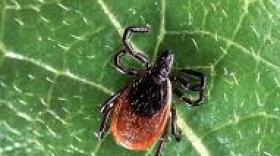Warm and wet weather has contributed to high tick populations this summer. WAMC’s Southern Adirondack Bureau Chief Lucas Willard reports on a New York state legislative hearing on tick-borne diseases held in AlbanyTuesday.
A rarely seen tick-borne illness was detected in Saratoga County earlier this year. The deadly Powassan virus was blamed for the death of a man there.
At a hearing before the Senate Task Force on Lyme and Tick-Borne Disease on Tuesday, State Health Commissioner Dr. Howard Zucker revealed that through the testing of 2,700 ticks in Saratoga County, 22 were positive for Powassan virus.
Zucker told the Senate Task Force that the Department of Health has stepped up efforts to educate individuals online.
“The department and local health departments have used public-facing web pages for years to make information about tick-borne diseases available to the public,” said Zucker. “One of the features of which we are most proud of is the recent addition of four short videos to our public website, which include issues about tick collection, tick testing, personal protection and proper use of repellents, and proper tick removal.”
Zucker said the Health Department is also collaborating with the state Education Department to implement legislation that would make tools and materials available to teachers and students.
TheHealth Department is set to release a tick-borne disease surveillance and response plan, similar to what the state does with mosquito-borne illness. Tick collection and testing results will also be made available to the public through the Health Data NY webpage.
Asked about the development of a Lyme disease vaccine for humans, Zucker explained that research is ongoing at the international level.
“The European community is now working on a vaccine; it’s in a Phase 1 trial so they have 180 individuals who are in the first part to see its safety, then it willmove forward to Phase 2 and Phase 3. We need to work on this and I recognize that it would be great to have a vaccine, but I think we also need to remember the other tick-borne illnesses.”
Which is why, Zucker said, prevention is so important.
Republican Senator Betty Little, who represents portions of the North Country, wanted to see more messaging in the media.
“I would like to see, and maybe I’ve missed them and you’re doing them, is TV ads that try to educate people a little bit better about ticks and what to watch for and how to take care of them, especially with the Powassan thing where he had people die,” said Little.
Zucker responded that the department has done TV spots, and the state is also increasing messaging through social media and smart devices.
Senator Kenneth LaValle, of Suffolk County on Long Island, where Lyme disease is prevalent, said he wanted to see more dollarsin the state budget dedicated toward research and developing a vaccine.
“I mean, it’s incredible the number of people that have Lyme or a member of their family, so I think we need to start off in the state budget with a good amount of money. And I think that money is not only only some of the things that have been talked about in terms of public service, notices, and so forth, but research,” said LaValle.
Asked about cooperation with federal agencies, Dr. Zucker explained the State Health Department is coordinating with the Centers for Disease Control and Prevention in the TickNET effort and a five-year, $10 million grant.
Zucker said the state will continue to work with the FDA on moving vaccine research forward, adding that the state’s Wadsworth Lab works closely with the National Institutes of Health.
The Commissioner added that he will bring concerns to the Region 2 Director of the Department of Health and Human Services at an upcoming meeting.





